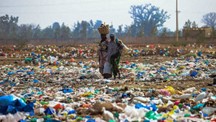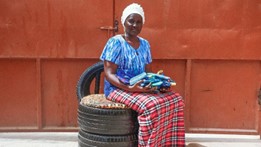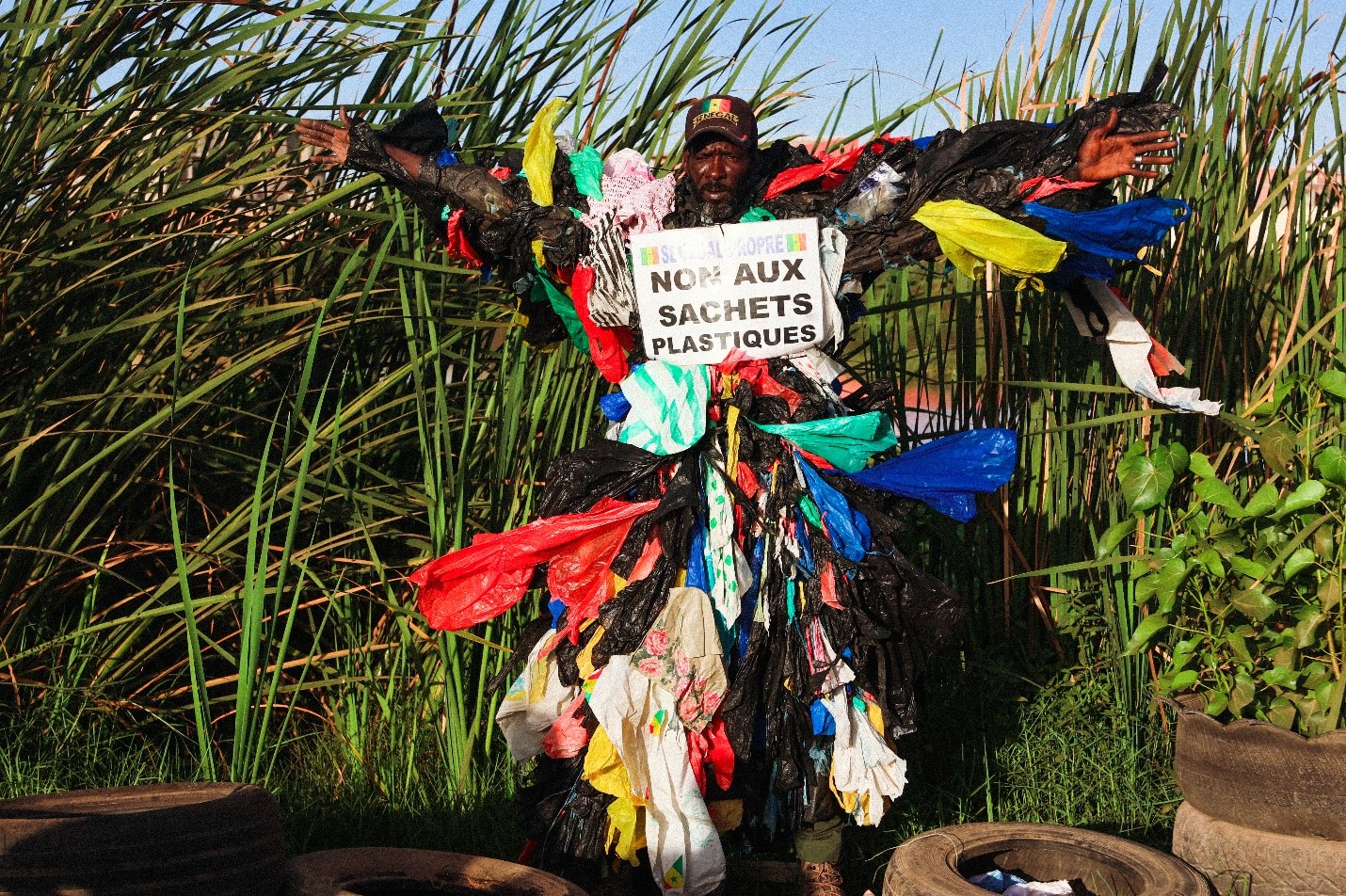Blog |
"Our treasure is dying": the West African coastline in the fight against plastic waste
Plastic waste in West Africa's coastal areas is causing problems for local communities.
"These bags are part of the five million plastic bags that the people of Dakar use every day before throwing them on the street". With his strange outfit made from plastic waste collected from the streets, Modou Fall, known as Mr Plastic, has been working for years to raise awareness of plastic pollution.
An eye-opening ecological disaster
In 2018, 6.9 million tonnes of plastic waste were dumped by the 17 coastal countries of West Africa. Nigeria alone produces 4.7 million tonnes a year. With 20% of this waste produced within 30 kilometres of the coast, most of it ends up in the ocean.
In response to this unprecedented challenge, the West African Coastal Area Management (WACA) programme, funded to the tune of $563 million by the World Bank and its partners, has prepared a series of reports on the impacts of plastic pollution, opportunities for a circular economy, Senegal's management of end-of-life polyethylene terephthalate (PET) bottles, and an e-book on resources to help individuals create their own mobilisation logic.
In West Africa, the cost of damage from marine plastic pollution is estimated at between $10,000 and $33,000 per tons. Fishing and aquaculture, maritime tourism, seaside property values, biodiversity and ecosystems are the sectors hardest hit.
Land and livestock are our only resources. When plastic waste is burnt in the fields, no plants can grow, and no seeds can germinate. Our cows, goats and sheep eat the plastic littering the streets and die as a result. Said Ndiouck Mbaye, President of Rural Women of Senegal.
 The village of Joal on the Senegalese coast is a case in point. Sitting on an island of seashells, Joal is surrounded by a plastic tide. Thousands of used plastic bags litter the beach, clinging to the mangrove branches that serve as nurseries for crabs and fish, entangling baby turtles and preventing them from making their way from the nest to the sea, and keeping tourists away.
The village of Joal on the Senegalese coast is a case in point. Sitting on an island of seashells, Joal is surrounded by a plastic tide. Thousands of used plastic bags litter the beach, clinging to the mangrove branches that serve as nurseries for crabs and fish, entangling baby turtles and preventing them from making their way from the nest to the sea, and keeping tourists away.
Almost 80% of plastic waste is poorly managed in West Africa's coastal zones, posing growing challenges to populations, economies, and the coastal and marine environment.
The scourge is having a direct impact on the lives of farmers. In Kaolack, Senegal, Ndiouck Mbaye, President of the Rural Women of Senegal, laments: "Land and livestock are our only resources. When plastic waste is burnt in the fields, no plants can grow, and no seeds can germinate. Our cows, goats and sheep eat the plastic littering the streets and die as a result.
Involve businesses and create new wealth.
Most plastic pollution comes from packaging, mainly single-use plastic used for drinking water and food, or for sanitary purposes. The support of stakeholders and companies aware of their responsibilities is crucial to a successful reform.
For example, the Kirène Group, which produces 700,000 litres of beverages a day, focuses 88% of its production on large-format 1.5 or 10-litre water bottles to reduce the use of small water sachets or small bottles, which are at the heart of the problem. These are now essential in West Africa, giving the most vulnerable people access to inexpensive drinking water. In Ghana in 2014, the use of plastic water containers led to a 42% drop in the infant mortality rate. Kirène is now extending its activities into recycling with partners such as Recuplast.
"Our Recuplast branch specialises in bottle recovery, eco-management and promoting the circular economy. This plastic waste collection network recovers the plastic, pays people or gives them recycled products such as basins, tables and chairs. We're even thinking of setting up joineries to make furniture from recycled plastic instead of cutting down trees and exacerbating deforestation," explains director Macoumba Diagne. Today, Recuplast collects between 100 and 150 tons of plastic waste a month, employs 240 people and provides a livelihood for 5,400 through recovery-related activities.
Committed elected representatives and communities
But elected representatives are also getting involved in this key battle of the 21st century. For Dudu Jalloh, a local councillor in Kanifing in the Gambia, it's also a question of raising awareness: "Although laws exist, it's difficult to enforce them. We need an aggressive public awareness program.
Bad habits die hard. Some fishermen readily admit that their practices are harmful: "When we go out to sea, we take petrol, food, tea and coal wrapped in plastic, which we then throw into the sea," explains Abdou Rahman, a fisherman from Bargny in Senegal. He adds this anecdote, which illustrates the scale of the problem: "Even before entering the sea, the plastic wraps around our engines and prevents us from working and feeding our families.
His colleague Macodou Gueye insists: "Another problem concerns our nets. Some of them are made of plastic, and when they get damaged, we leave them in the sea. And when asked what he sees most at sea: "Hundreds and hundreds of babies' nappies floating everywhere!
Proposed solutions
West Africa has few factories manufacturing plastic products. Most countries depend on imports of virgin plastic resins and plastic products. Investment is needed in waste management, with collection, sorting of plastics for reuse and recycling, and, as a last resort, landfill. The current linear model (produce - consume - dispose) must evolve towards a circular economy model for plastics, supported by innovation and an appropriate regulatory framework. This also requires private sector investment and the creation of dynamic markets for recycled plastics and plastic substitutes.
The World Bank intervenes at every stage of the plastic life cycle to support countries in their fight against this scourge, with projects worth more than $2.5 billion focusing on the management and prevention of plastic pollution. It also provides expertise, encourages private investment and supports regional institutions to provide cross-border solutions.
 For Isatou Ceesay, reform must start at home with women and children. Her NGO, Women in Gambia, educates children about waste management and teaches women to recycle waste into bags, pouches and key rings, thereby generating an income for themselves.
For Isatou Ceesay, reform must start at home with women and children. Her NGO, Women in Gambia, educates children about waste management and teaches women to recycle waste into bags, pouches and key rings, thereby generating an income for themselves.
A circular economy model could reduce plastic waste by 40 to 50% - or 2.9 to 3.8 million tonnes of plastic waste - and prevent it ending up as environmental waste by 2026. This would correspond to a reduction in carbon emissions of 30 to 60%, or CO2 emissions of between 6 and 9.1 million tonnes.
USEFUL LINKS
- West Africa Coastal Areas Management Programme (WACA)
- eBook WACA - Plastic pollution
- Economic analysis of marine plastic pollution in West Africa
- Plastic pollution in West African coastal zones - Synthesis
- Circular economy in West Africa: Realising the potential of plastics
- Video: "Our treasure is dying": West Africa's coastline in the fight against plastic waste
- The World Bank in West and Central Africa
- Regional integration in Africa
